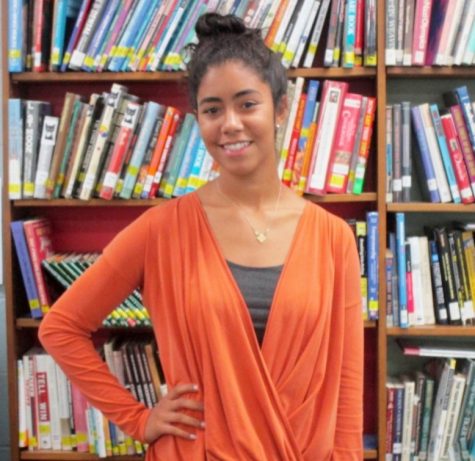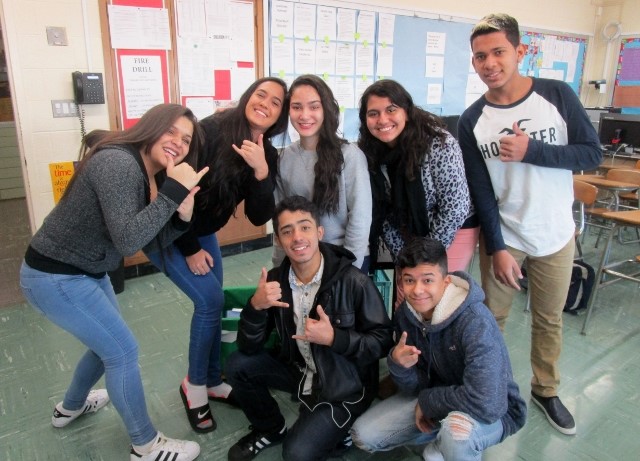New School, New Language
For ELL Students, English is the Top Priority
Standing Leticia Ferreira ’20, Jennifer Monteiro ’19, Katheleen Carvalho Pinto ’20, Maria Livia Henriques Pinto ’20, and Rafael Goncalves ’20 Crouching Matheus Alvares ’20 and Pedro Souza ’20 Missing Lucas Silva ’18 and Stephane Felix ’19
Abington is getting more diverse by the year, and some students come to Abington not quite ready to jump into the classroom. The Brazilian population in Abington has grown in recent years, which may be due to preexisting Brazilian residents referring others to our quaint town. As a result, Abington High School has had a number of non-English speakers, most of them Portuguese speakers, enroll in the English Language Learners program (ELL). We interviewed several students in the current program. Lucas Silva ’18, Leticia Ferreira ’20, Jennifer Monteiro ’19, Katheleen Carvalho Pinto ’20, Stephane Felix ’19, Matheus Alvares ’20, and Rafael Goncalves ’20 provided an inside look at what non-English speakers go through when they first arrive at AHS.
Most students may take going to class for granted and working in groups as normal class activity. However, if you just arrived from another country it is not that simple. On their first day at school, the student takes a test (WIDA W-APT) to determine what level of proficiency they are at. Then, ELL is combined into the student’s regular class schedule. Students in levels 1 and 2 have ELL for two periods a day or for one period a day if they are in levels 3 to 5.
Imagine being in a place where you don’t know anyone and you don’t understand what they are saying, and they also can’t understand you. It is something that is hard to imagine for English speakers in the United States. ELL students have fears of being put on the spot in class, and it seems to them like there is no one to turn to or talk to. These feelings are the same for most new students, but ELL students have trouble making friends because they don’t know how to make conversation. “You don’t ask to go to the bathroom because you don’t know how,” said Monteiro. This is just one of the many barriers they face upon arriving here. But, when they are asked about these difficulties, they laugh instead of getting sad. Having to wait to go to the bathroom has become an inside joke to them.
The good thing is that the process is not all that bad, and it gets better. The teachers become familiar and supportive of them. Friends they make in school become a support system and help them through the day to day. Silva reminded us that change is good. When he lived in Florida, he only hung out with Brazilians, so his English didn’t get much better. But here, he joined the football team, and his English improved significantly. Seeing improvement in students that came before and went through the process already gives the newcomers hope. “I dream of becoming fluent by the time I graduate and then go to college,” said Alvares.

ELL Teachers Ms. Despres and Ms. Scofano
This experience is special for the student and the teacher. Ms. Despres teaches ELL at AHS. “As an ELL teacher, I learn so much from my students. Sometimes I feel like I learn more from then than they do from me. They have taught me about their native languages and cultures,” said Ms. Despres.
From the student’s perspective, Carvalho Pinto thinks that the schooling in the U.S. is a good difference. “I like the different method of teaching, because here, the teacher interacts with the student and I didn’t have that in Brazil,” said Carvalho Pinto.
_________________________________________________________________________
Leticia Da’Silva ’18 is an example of a student who was able to progress from knowing little to no English, to being fluent in English with help from the ELL program. She came to the U.S. when she was 14-years-old and only knew how to say “Hi.” Today, she is a junior with a full class schedule. She sets the standard for other ELL students to work towards. During a brief interview, she told us about her experience.
How much English did you know when you arrived? I knew how to say “Hi.”
How difficult was that for you? It was so hard and scary.
How did you cope? I listened to music and looked for the lyrics. I would look up the translation of the song, and that would help me a lot.
Were your ELL teachers helpful? Yes a lot, because they always did things to help me.
What are you most proud of at this point? I passed MCAS (Massachusetts Comprehensive Assessment System). And, with that, I can see how much progress I have made in almost three years in America.

Brianna Medeiros is a member of the Class of 2017. She joined the Green Wave Gazette during her junior year and became Associate Editor her senior year....


Dorothy Bowler, ELL Teacher • Mar 22, 2017 at 3:51 PM
Congratulations , Leticia, for passing MCAS!! You have made excellent progress since that first day when you walked into my ELL class and could only say “Hi!” I am so proud of you! You are truly an inspiration to your peers as well as to all ELLs in Abington! Keep up the great work!